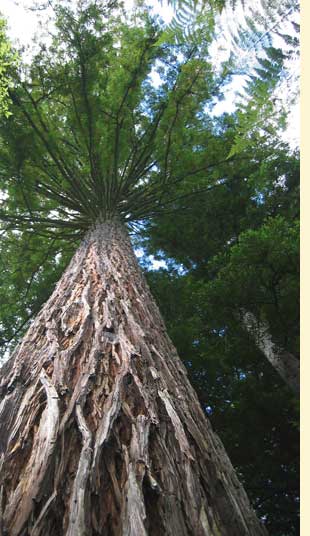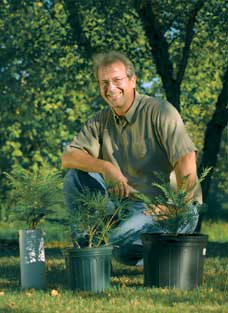Pine Gene Catalog to Aid
Biofuels Research
University of Georgia researcher is spearheading a project at the U.S. Department of Energy’s Joint Genome Institute that could help develop pine trees tailored to the needs of the bioenergy industry. Toward that end, Jeffrey Dean, forest biotechnologist at UGA’s Warnell School of Forestry and Natural Resources, aims to greatly expand the gene catalog for pines and initiate the first gene-discovery efforts in five other conifer families.
 “The wood from conifers will almost certainly be an important component of this nation’s bioenergy strategy,” said Dean. “And yet, despite extensive commercial plantations, conifers remain essentially an undomesticated species.”
“The wood from conifers will almost certainly be an important component of this nation’s bioenergy strategy,” said Dean. “And yet, despite extensive commercial plantations, conifers remain essentially an undomesticated species.”
Dean said by comparing the genes expressed by different conifer species in tissues under similar conditions, scientists could more quickly identify the key genes that control tree growth and development. Such studies will also help scientists understand the formation of biomass components—lignin, for example—that impede the processing of biofuels derived from plant materials such as wood.
“Although the Joint Genome Institute recently produced a complete genome sequence for poplar—the first woody perennial plant species so characterized—information is limited for conifers,” Dean said.
While final details on specific species and numbers of sequences are still being worked out, lead-investigator Dean and his four co-investigators—David Neale, of the University of California, Davis; Glenn Howe, of Oregon State University; Kathleen Jermstad, of the U.S. Department of Agriculture’s Forest Service; and Deborah Rogers, of the Center for Natural Lands Management—will focus their initial efforts on loblolly pine. A conifer native to the southeastern United States, this species alone is responsible for about 16 percent of the world’s annual timber harvest.
“Loblolly pine is a primary target for this research project not only because of its current commercial importance but also from its potential for providing biomass to future biofuels markets,” Dean said. Other targeted species for the project include coast redwood, one the fastest growing conifers, and Wollemia nobilis, a species related to the Norfolk Island pine that was believed extinct until a small grove was discovered in Australia in 1994.
More than 50 research laboratories around the world have pledged their support for this project. They and many others will benefit from immediate access to gene sequences from the project, all of which will be available online as they are produced.
For more information, contact Jeffrey Dean at: jeffdean@uga.edu
 |


